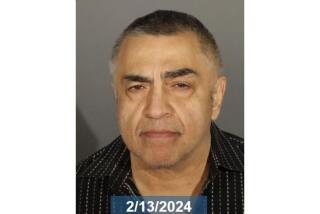Phony Trust Deed Scam Uncovered : 10 Southland Homeowners’ Rights to Property Clouded
- Share via
At least 10 Los Angeles and Orange County homeowners have been victimized in what authorities say is a recurring Southland scheme involving phony trust deeds that cloud their rights of property ownership, making it impossible for them to sell or borrow against their property.
The 10 forged trust deeds purport to document $219,000 in equity loans, but the loans were never made. Authorities say the deeds probably were sold at a discount by the forger to unwary investors who thought they were purchasing real loan securities.
The false deeds are causing major headaches for the victims, who must spend thousands of dollars and months of their time in a complicated legal procedure to regain clear title to their properties.
Because they were recorded as part of county property records, the phony deeds are considered evidence of liens against the properties.
The forged deeds, the latest in a continuing series of such scams, underscore the ease with which false documents can be filed. Several of the victims said they favor reviving a dormant campaign to reform the state’s property records system.
Forged trust deeds crop up regularly, according to officials at the Orange County recorder’s office and at title insurance companies.
And because of the huge volume of property transactions, steadily inflating property values and the acceptance of trust deeds as a marketable commodity, California is a favorite target of confidence artists who use bogus trust deeds as collateral for other loans or sell them to investors, said Jack Reed, publisher of Real Estate Investors Monthly, an investment newsletter.
Property owners, as Tustin resident Wayne Overbeck discovered, have no real protection against fraudulent trust deeds because state law does not require notification of owners when the documents are filed.
Overbeck, an attorney who teaches communications law at Cal State Fullerton, discovered that he was a deed scam victim when he received a letter late last month urging him to refinance the loan on his home in Manhattan Beach because interest rates were low.
“I don’t know what made me open the envelope and read the letter,” he said. “I usually just throw that kind of mail away. But I’m glad I looked at this one.”
The property in question is the home in which Overbeck’s mother has lived for 32 years. She deeded the property to Overbeck several years ago when he took over management of her financial affairs.
While the solicitation from the mortgage firm referred to a loan on the property, Overbeck knew that the mortgage had been paid off nearly two decades ago and that the property was unencumbered.
“I called the company and asked where they got their information
and was told that it came from Los Angeles County property records,” he said.
Overbeck discovered that a $28,000 trust deed had been filed in the county recorder’s office. Both his signature and his mother’s had been forged. The beneficiary’s name, as listed on the document, apparently was fictitious. The address to which the documents were to be mailed was a private postal drop on Pacific Coast Highway in Torrance.
Acting on a hunch, Overbeck checked the recorder’s index to see if other deeds had been filed listing the same beneficiary. He found that the same person--or a person using the same name--had filed nine other trust deeds on the same day last September, all on homes in the South Bay area and all for relatively small amounts of money.
Two of the deeds were on houses along the same street and in the same block as his mother’s home. Overbeck decided to call on the owners to see if the deeds were legitimate.
They weren’t.
Susumu Niimi, a self-employed real estate investor, said he was shocked when he received Overbeck’s call.
“I do this for a living; I’m supposed to be fairly sophisticated,” he said, “but I had no idea it was that easy” to record a deed without the owner’s knowledge.
Niimi, who plans to mount a campaign for reform of the recording system, said he and Overbeck contacted several others whose property had been encumbered by the deeds Overbeck found.
“All of them said they were phony,” Overbeck said. Several of the victims, he said, were elderly women who “got hysterical when we tried to explain what had happened and what it meant.”
The two men complained to local police, who have begun an investigation. A police detective, who asked that his name not be used and that his department not be identified for fear of jeopardizing his investigation, said he agrees with Niimi that the system of recording trust deeds needs to be revised to make it more difficult for people to file phony deeds.
Lee Branch, Orange County’s recorder, also believes that some sort of reform is needed.
Branch has testified before a state legislative committee that began looking into document recording reforms after a similar fraud scheme involving more than 30 homeowners in Orange and Los Angeles counties was uncovered in 1983. He said he believes that tighter controls should be imposed on the issuing of notary stamps.
All trust deeds and most other property documents must be notarized--a form of guaranteeing that signers are who they purport to be.
The notary stamp appearing on the 10 deeds uncovered by Overbeck apparently was forged, but Branch claims that a crook needn’t go to all that trouble. “Almost anyone can get a notary stamp” simply by ordering one from a company that makes rubber stamps, he said.
More to Read
Sign up for Essential California
The most important California stories and recommendations in your inbox every morning.
You may occasionally receive promotional content from the Los Angeles Times.










